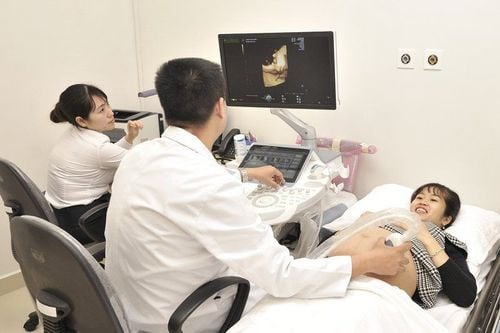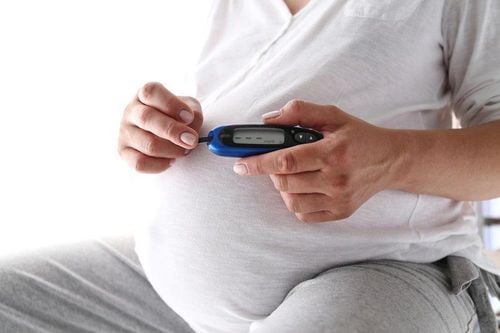This is an automatically translated article.
The article is professionally consulted by Master, Doctor Trinh Thi Thanh Huyen - Department of Obstetrics and Gynecology - Vinmec Hai Phong International General Hospital.Routine antenatal check-ups keep mother and baby healthy during pregnancy. During different visits, your doctor may discuss a variety of issues with you, such as healthy eating and physical activity, and health screenings.
1. First prenatal check-up: the fetus is from 5-8 weeks old
During your first visit, your doctor will perform a complete physical examination, draw blood for tests, and calculate your expected date of birth. Your doctor may also perform a breast exam, a pelvic exam to check your uterus (womb), and a cervical exam, including a Pap test. Your doctor will also take your medical history. Specifically as follows:Confirm that you are pregnant or not. Calculate how many weeks pregnant you are and estimate the due date. You may be offered an ultrasound if the date of pregnancy is unknown. Blood pressure, height and weight. Full blood test, to check blood type, check for anemia, immunity to rubella, hepatitis B, hepatitis C, syphilis, chlamydia and HIV. Urine test to see if you have a bladder or urinary tract infection. Cervical screening to check for human papillomavirus (HPV) and/or any signs of cervical cancer. If there is a risk of vitamin D deficiency, the doctor will order tests.
Trắc nghiệm: Bạn có biết nên khám thai lần đầu vào lúc nào không?
Việc khám thai lần đầu mang ý nghĩa rất quan trọng, giúp bạn xác định chính xác mình có mang thai hay không? Thai nhi đã vào buồng tử cung hay chưa?... Vì vậy, nếu chưa biết khám thai lần đầu vào lúc nào, trả lời nhanh 5 câu hỏi trắc nghiệm sau sẽ giúp bạn có câu trả lời.You will also usually discuss the following with your doctor or midwife:
What medications are you taking. Do you smoke or drink alcohol? Do you want a flu (flu) vaccine? What vitamin and mineral supplements you can or should avoid. Antenatal care options are available to you. Where you can get more information and prenatal classes.

Lớp học tiền sản tại Bệnh viện Đa khoa Quốc tế Vinmec
2. 2nd antenatal check-up: fetus from 11 weeks to 13 weeks and 6 days
Check blood pressure. Check your baby's growth. Ultrasound to check physical development, growth, and any complications with your pregnancy. Check Double test .
3. 3rd antenatal checkup: fetus from 16 weeks to 22 weeks
Check blood pressure. Measure your belly (palpate your belly) to check your baby's growth Triple test.
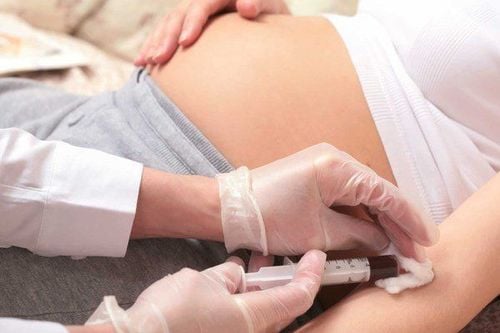
Lấy mẫu máu để làm xét nghiệm sàng lọc trước sinh Double test
4. 4th prenatal check-up: 22 weeks to 28 weeks pregnant
Check blood pressure. Check your baby's growth. Glucose tolerance test for diabetes. Assess cervical length. Vaccination VAT. Fetal morphology ultrasound.
5. 5th antenatal checkup: fetus from 28 weeks to 32 weeks
Check blood pressure. Check your baby's growth. Check your baby's heart rate and movements in the womb. Discuss your birth plans. Blood tests to check for anemia and blood platelet levels. You may also be tested again for syphilis, hepatitis B, hepatitis C, and HIV. If your blood type is Rh (-), immunoglobulin can be injected. Whooping cough (pertussis) vaccination. 2nd VAT vaccination. Urine test, if you have signs of urinary tract infection or high blood pressure.
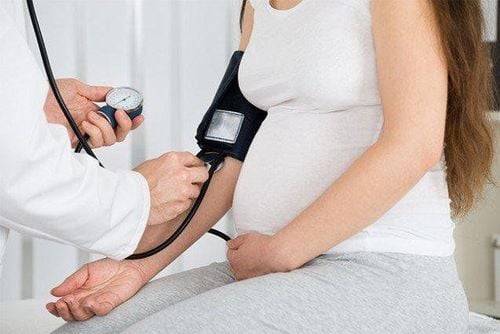
Bà bầu cần được kiểm tra huyết áp trong giai đoạn này
6. 6th antenatal checkup: fetus from 32 to 34 weeks old
Check blood pressure. Measure your belly (palpate belly) to check your baby's growth. Non-stress test: Check your baby's heart rate and movements. Urinalysis, if you have signs of a urinary tract infection or high blood pressure.
7. 7th antenatal checkup: The fetus is from 34 to 36 weeks old
Your belly (palpate your belly) to check your baby's growth. Check your health how and if you have any problems. Non-stress test: Check the baby's heart rate and movements in the womb. Urinalysis, if you have signs of a urinary tract infection or high blood pressure. Vaginal swabs check for the presence of group B streptococcus (GBS). If your blood type test is Rh (-), a second injection of immunoglobulin can be given.
8. 8th, 9th, 10th prenatal check-up: The fetus is from 36 to 39 weeks old
Check blood pressure. Measure your belly (palpate your belly) to check your baby's growth. Non-stress test: Check the baby's heart rate and movements in the womb. Urinalysis, if you have signs of a urinary tract infection or high blood pressure.
9. 11th prenatal check-up - fetus from 39 weeks old
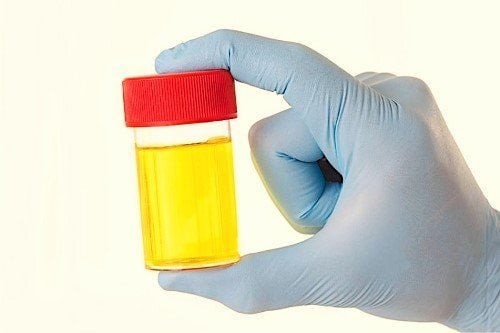
Xét nghiệm nước tiểu có theer được chỉ định nếu có dấu hiệu nhiễm trùng đường tiết niệu hoặc tăng huyết áp
Check blood pressure. Measure your belly (palpate your belly) to check your baby's growth. Non-stress test: Check the baby's heart rate and movements in the womb. Urinalysis, if you have signs of a urinary tract infection or high blood pressure. Check your baby's heart rate and the amount of amniotic fluid around the fetus. Your GP, midwife, or obstetrician may offer follow-up tests, depending on your risk factors and circumstances. These may include:
Placental biopsy (CVS), in which a small amount of the placenta is taken to check for chromosomal problems such as Down syndrome or other abnormalities. This is usually done between 10 and 11 weeks of pregnancy, or at another time if a problem is suspected. Non-invasive prenatal test (NIPT), which is a very accurate test for Down syndrome and a number of other abnormalities. It is taken between 11 weeks and 13 weeks and 6 days of pregnancy. Ultrasound measures the nuchal translucency or skin behind the fetal neck to assess the risk of Down syndrome. This test is done between 11 weeks and 13 weeks and 6 days. Amniocentesis, in which a small amount of amniotic fluid (the fluid around the baby) is collected to check if the baby has a chromosomal problem or other abnormality. This is usually done at 15-18 weeks or at another time if a problem is discovered. The Department of Obstetrics and Gynecology - Vinmec International General Hospital has solved many difficult cases such as amniotic fluid infection, polyhydramnios, placenta accreta, knotted umbilical cord, preterm pregnancy... To facilitate the pregnancy process Moreover, Vinmec has implemented PACKAGE Maternity Packages, including prenatal, perinatal and postpartum care services. Pregnant women are monitored and carried out all necessary tests and ultrasounds to detect pregnancy abnormalities early. The birth will be "gentle" like going on vacation, at the hospital, there are fully equipped for mother and baby.
Vinmec International General Hospital gathers a team of highly qualified doctors at home and abroad as well as the quality of ultrasound machine system, modern equipped medical equipment, main prenatal examination procedures. Accurately, science will handle abnormalities during pregnancy and labor quickly, helping women have the safest pregnancy.
For more information about Vinmec's maternity packages, please contact the hospitals and clinics of Vinmec health system nationwide
Please dial HOTLINE for more information or register for an appointment HERE. Download MyVinmec app to make appointments faster and to manage your bookings easily.






